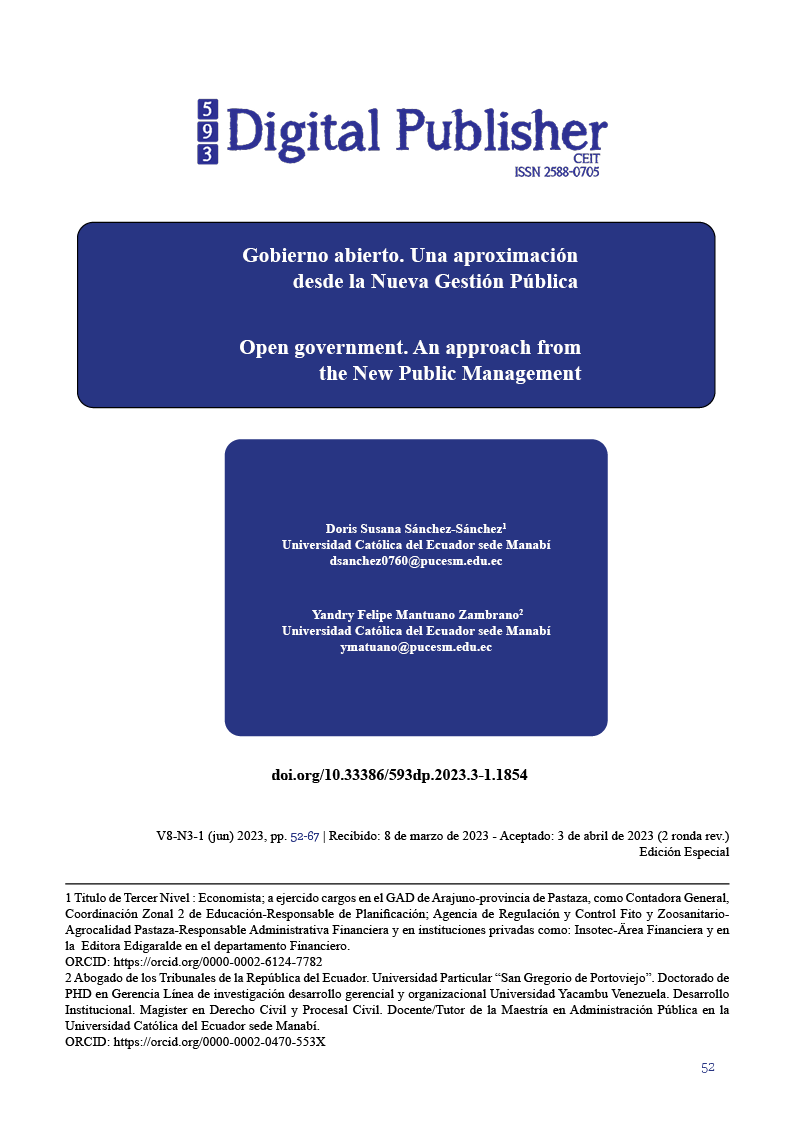Open government. An approach from the New Public Management
Main Article Content
Abstract
The main orientation of this article is to reflect on the contributions of the New Public Management to the success of an open government, accompanied by two guidelines that seek to sustain the purpose of the research, such as identifying the principles of the New Public Management that contribute to the open government discourse and interpreting the narrative on open government from an investigative position. Its methodological route is raised from a phenomenological perspective with a qualitative approach and inductive dimension, with a descriptive and documentary level, in addition to being a field and non-experimental research; as a data analysis strategy, the one proposed by the grounded theory (Strauss and Corbin) was used; from the interpretative phase, the hermeneutic method was applied to understand and understand the discourse of key informants, in this case being experienced researchers, who narrated their empirical and scientific experiences on the issues of open government and on the dogmas of the New Public Management, this thanks to the so-called in-depth interview. The research found among its substantive findings the possibility of a central category that includes all the substantive concepts of the research, being called this category: Open Government: A new paradigm of public management. This proposal of good practice allows the public institutions of the Province of Manabí to find principles of citizen participation and transparency focused from the perspective of institutional governance.
Downloads
Article Details

This work is licensed under a Creative Commons Attribution-NonCommercial-ShareAlike 4.0 International License.
1. Derechos de autor
Las obras que se publican en 593 Digital Publisher CEIT están sujetas a los siguientes términos:
1.1. 593 Digital Publisher CEIT, conserva los derechos patrimoniales (copyright) de las obras publicadas, favorece y permite la reutilización de las mismas bajo la licencia Licencia Creative Commons 4.0 de Reconocimiento-NoComercial-CompartirIgual 4.0, por lo cual se pueden copiar, usar, difundir, transmitir y exponer públicamente, siempre que:
1.1.a. Se cite la autoría y fuente original de su publicación (revista, editorial, URL).
1.1.b. No se usen para fines comerciales u onerosos.
1.1.c. Se mencione la existencia y especificaciones de esta licencia de uso.
References
Adler P., y Adler P. (2002). Observational teclmiques. Ed. Norman. Lincoln (comps), Collecting and inte1jJreting qualitati-oe materials. http://www.derechoshumanos.unlp.edu.ar/assets/files/documentos/como-hacer-investigacion-cualitativa.pdf
Álvarez-Gayou J. (2003). Cómo hacer investigación cualitativa: Fundamentos y Metodología. Editorial. Paidós.
Arellano, Sánchez y Retana (2018). ¿Uno o varios tipos de gobernanza? Más allá de la gobernanza como moda: La prueba del tránsito organizacional. Revista Cuadernos de Gobierno y Administración Pública. ISSN 2341-3808, Vol. 1, Nº. 2, https://dialnet.unirioja.es/servlet/articulo?codigo=4998735
Banco Mundial (2022). La gobernanza mundial. Informe 2020. https://www.bancomundial.org/es
Barzelay, M. (2018). La Nueva Gestión Pública. Fondo de Cultura Económica,
Primera Edición en español.
Cátala, J.P. (2019). Gobernabilidad democrática para el desarrollo humano. Marco conceptual y analítico. Revista Instituciones y Desarrollo. https://journals.openedition.org/polis/12661
CLAD (2020). Carta Iberoamericana de Innovación en la Gestión Pública. Documentos del CLAD: Consensos y Declaraciones. https://clad.org/wp-content/uploads/2020/10/Carta-Iberoamericana-de-Innovacion-10-2020.pdf
CLAD (2010). Gestión pública Iberoamericana: Documentos del CLAD: Consensos y Declaraciones. https://clad.org/wp-content/uploads/2020/07/Gestion-Publica-Iberoamericana-para-el-siglo-XXI.pdf
CLAD (2008). Carta Iberoamericana de Calidad en la Gestión Pública. Documentos del CLAD: Consensos y Declaraciones. https://clad.org/wp-content/uploads/2020/07/Carta-Iberoamericana-de-Calidad-en-la-Gestion-Publica-06-2008.pdf
CEPAL (2018). Plan de gobierno abierto Una hoja de ruta para los Gobiernos de la región. Serie manuales. En línea: https://repositorio.cepal.org/bitstream/handle/11362/36665/4/S1700687_es.pdf
Comisión de las Comunidades Europeas (2001). La gobernanza europea - Un Libro Blanco. Comunicación de la Comisión. [COM. 428 final - Diario Oficial C 287 de 12.10.2001]. https://eur-lex.europa.eu/ES/legal-content/summary/white-paper-on-governance.html
Constitución de la República del Ecuador (2008). Decreto Legislativo 0 Registro Oficial 449 de 20-oct-2008 Ultima modificación: 13-jul-2011 Estado: Vigente. https://www.oas.org/juridico/pdfs/mesicic4_ecu_const.pdf
Crozier M. (1997). La transición del paradigma burocrático a una cultura de gestión pública. Revista del CLAD, No. 7.
Damiani, L.F. (2009). Epistemología y ciencia en la modernidad. Universidad Central de Venezuela. Ediciones de la Biblioteca-EBUC, ediciones FaCES-UCV.
Drucker, P. (1992). Management. Edit. Harper & Row.
Eisner, E.W. (1998). El ojo ilustrado. Indagación cualitativa y mejora de la práctica educativa. Editorial PAIDOS.
Fukuyama F. (2013). La gobernanza: una nueva forma de gobernar frente a los problemas públicos. https://consynergiamx.wordpress.com/2016/02/02/la-gobernanza-una-nueva-forma-de-gobernar-frente-a-los-problemas-publicos/
Gadamer H. G. (2001). Fundamentos de la Hermenéutica. Siglo XX Editores.
Guerrero, O. (2005). La gerencia pública en la sociedad post-industrial. Revista Venezolana de Gerencia v.10 n.31 Maracaibo, Venezuela.
Hernández-Sampieri R. (2017). Metodología de la Investigación. 7ma. Edición. https://www.uca.ac.cr/wp-content/uploads/2017/10/Investigacion.pdf
Kooiman (2017). Modelo de gobernanza interactiva. Revista Territorios y regionalismos. http://revistasacademicas.udec.cl/index.php/rtr/article/view/1360
Leftwich, A. (2005). Politics in Command: Development Studies and the Rediscovery of Social Science. http://www.scielo.org.mx/scielo.php?script=sci_arttext&pid=S0188-76532011000200002
Lincoln, Y. y Guba H. (1985). Naturalistic Inquiry.
Manchado E. (2010). Gobierno abierto: estrategias e iniciativas en Iberoamérica. Publicaciones de la CEPAL. https://clad.org/wp-content/uploads/2021/03/Libro-5-Gobierno-abierto-estrategias-e-iniciativas-en-Iberom%C3%A9rica.pdf
Mayntz, R. (2000). Nuevos desafíos de la teoría de Governance. Instituciones y desarrollo. Revista mexicana de sociología. https://www.eumed.net/rev/caribe/2017/04/gobernanza-cuba.html
Organización para la Cooperación y el Desarrollo Económicos (2014). Estudios de la OCDE sobre Gobernanza Pública. Reforma administrativa a la mejora continua. https://www.oecd.org/gov/PGR%20SPain%20Resumen%20Ejecutivo.pdf
Osborne D. y Gaebler. T (1994). La Reinvención del Gobierno. La influencia
del espíritu empresarial en el sector público. Editorial Paidos.
Peters, T. & Waterman, R. (1982). In Search of Excellence. Lessons from American´s Best Running Companies. Edi. Harper & Row
Plan Nacional de Desarrollo (PND, 2021). Plan de Creación de Oportunidades. Gobierno del Ecuador. https://observatorioplanificacion.cepal.org/es/planes/plan-de-creacion-de-oportunidades-2021-2025-de-ecuador
Programa de la Naciones Unidas para el Desarrollo (PNUD, 2007). La democracia de ciudadanía: Una agenda para la construcción de ciudadanía en América Latina. https://controlatugobierno.com/bibliografia/la-democracia-de-ciudadania-una-agenda-para-la-construccion-de-ciudadania-en-america-latina-pnud/
Ramírez-Alujas y Rosales (2020). Gobierno abierto y gestión pública para el desarrollo sostenible: paradojas, encrucijadas y péndulos en el contexto latinoamericano.
Strauss A, y Corbin J. (2012). Bases de la investigación cualitativa. Técnicas y procedimientos para desarrollar la teoría fundamentada. Ed. Universidad de Antioquia. En línea: https://diversidadlocal.files.wordpress.com/2012/09/bases-investigacion-cualitativa.pdf
Taylor S.J. y Bodgan R. (1998). Introducción a los métodos cualitativos de investigación. Editorial PAIDOS.
Toffler, A. (1993). El Shock del Futuro. Barcelona: Plaza & Janes.
Vegas-Meléndez H., y Solorzano Calero M. (2022). Nuevos enfoques en la gestión pública para una gobernanza institucional inteligente. Revistas 593 Publisher. Sep 30, 2022. https://www.593dp.com/index.php/593_Digital_Publisher/article/view/1448
Vegas-Meléndez H. (2017). Políticas públicas y gobernanza: Articulación para una gestión pública local autónoma. Revista Polis. https://journals.openedition.org/polis/12661
Vegas-Meléndez H. (2015). Gestión pública local, gobernanza y participación: una visión a partir del discurso de los actores sociales en Venezuela. Tesis Doctoral. http://mriuc.bc.uc.edu.ve/bitstream/handle/123456789/2119/hvegas.pdf?sequence=1
Vegas-Meléndez H. (2013). Investigación cualitativa para el abordaje de la gestión pública local. Revista Observatorio Laboral Revista Venezolana, Vol. 6, Nº 11. http://servicio.bc.uc.edu.ve/faces/revista/lainet/lainetv6n11/art04.pd



